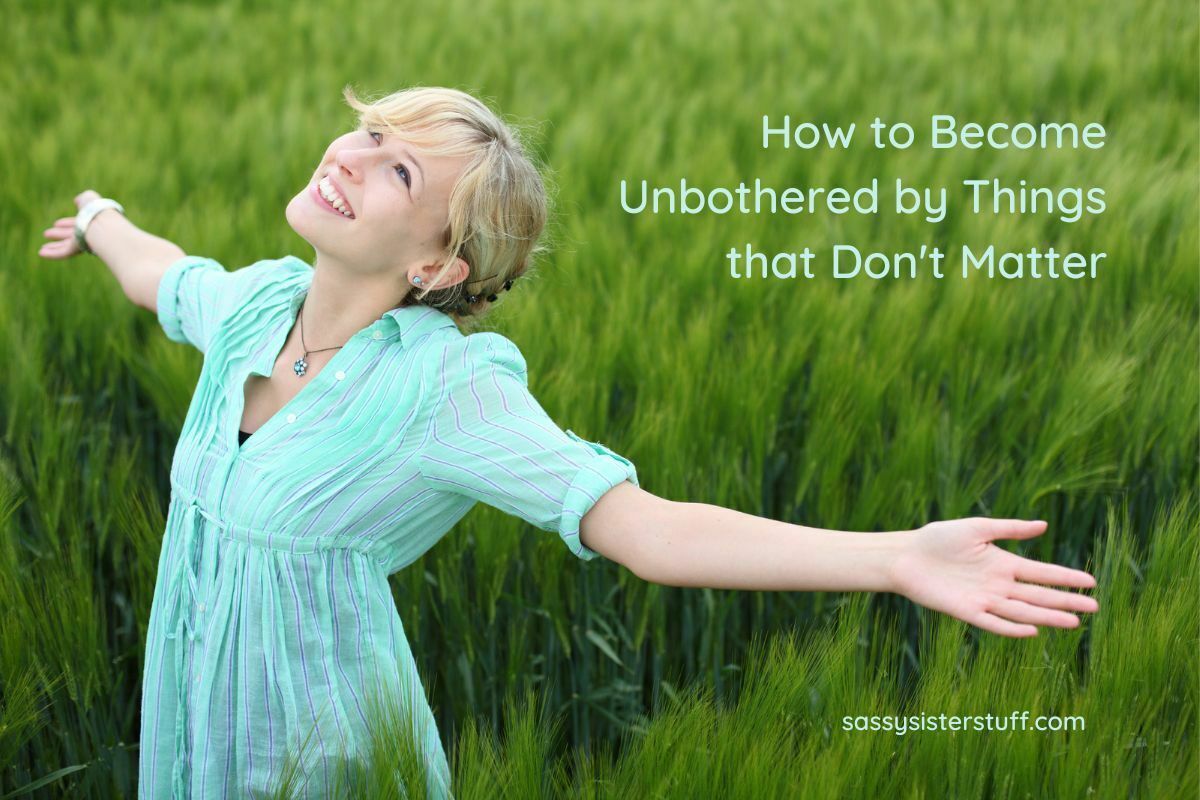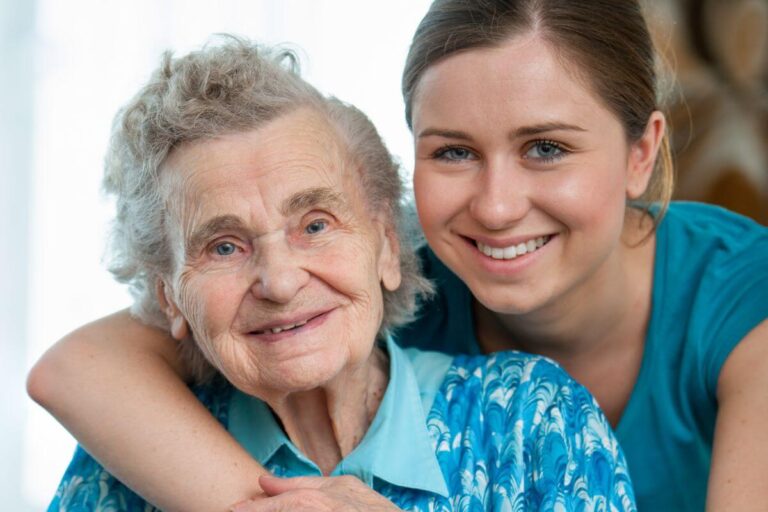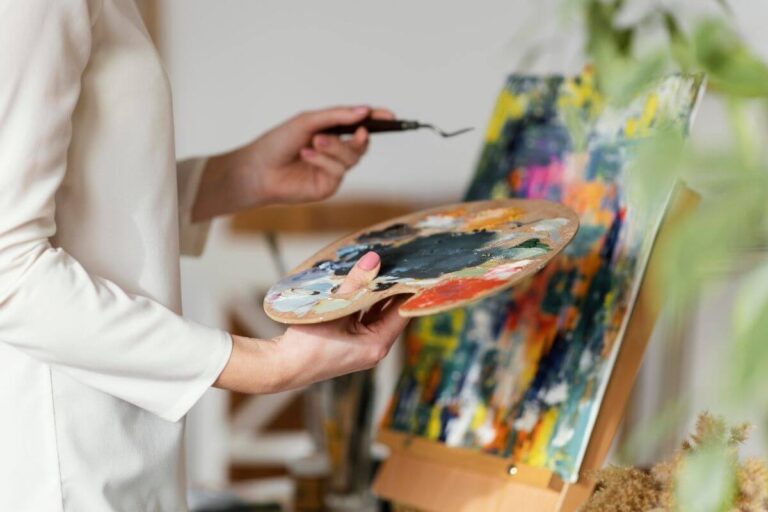How to Become Unbothered by Things that Don’t Matter
You can live a more simple and happy life when you learn how to become unbothered by things that trigger your emotions and cause you to overreact. If you can remain calm and unbothered by things that don’t matter, you’ll save your energy for things that do matter.
If you can learn how to not overreact and remain unbothered, you will be able to focus on things and people that bring value to your life. You’ll also learn elegance, grace, and peace of mind.

Below you’ll find 17 important ways to help you become unbothered by triggers and things that don’t matter in the grand scheme of things in your life. You’ll develop better coping skills and strategies to help you live that happy life you always wanted to live!
Related Article: Why Are Healthy Coping Skills Important in Life?

What Does It Mean to Become Unbothered
Let’s define unbothered before we move on.
The Merriam-Webster Dictionary defines unbothered as:
- not feeling or showing agitation, worry, or annoyance : not bothered.
Dictionary.com has a somewhat more complex definition of unbothered:
- not experiencing mental or physical discomfort: He was unbothered by the cold. He was unbothered about not being picked for the team.
- Slang. indifferent to criticism or negative comments; not annoyed or provoked: She was unbothered by her many haters. They swear they’re unbothered, but they care.
Some other words for unbothered are: 1) unconcerned, 2) undisturbed, 3) unworried.
But none of these words necessarily mean you are an uncaring or uncompassionate person. They simply mean that you are not being bothered by things that don’t offer value to your life in some way. Mostly the little things that don’t really matter — unnecessary drama, foolish behaviors, and differences of opinion.
Know Your Triggers
The average person has many triggers that can cause them to feel bothered or unsettled. If you can identify your triggers, you will be able to develop coping skills that help you learn how to become unbothered about even those triggers.
Do you sometimes get sweaty palms or develop a racing heart? These reactions are probably due to triggers. Do you feel offended when someone speaks to you in a fairly rude way? Often times, these involuntary feelings and reactions are a result of things that have happened in your past.
Take some time to reflect on what causes you to have these moments and why. Think about the last time you were triggered and acted-out in a way that was really not the best way. Really reflect and examine things from your past that might cause you to be overly-sensitive or reactive today.
Triggers can be loud voices, restless sleep, money problems, health issues, people who are oppositional, a conflict with a family member, a lack of specific details about an event, your absentminded husband, people with an apathetic attitude, a person who doesn’t know how to do their job.
Of course, these are just some examples so you’ll need to reflect on your own personal triggers so you can focus on some awesome coping skills that will help you be less bothered by them!

How to Become Unbothered about Things that Don’t Matter
These 17 important tips will help you learn to become unbothered about things without becoming salty or sarcastic. They are important coping skills that will also help prevent behavior or responses that you regret later.
These tips about how to become unbothered can help you in many settings. For example:
- how to be unbothered at school
- how to be unbothered at work
- how to be unbothered in social settings
- how to be unbothered in a relationship
- how to be unbothered with family and friends
- how to be unbothered in the community
Use these tips to practice walking your way through life with a more carefree attitude and you’ll learn how to become unbothered by things that don’t really matter.
1. Never respond to someone when you are angry.
Give yourself a minute to think and regain your composure and confidence. Some people naturally possess the art of not caring about what others do or say, but others have to work through intense situations. Let your anger subside before you respond.
2. Learn to respond instead of react.
An immediate emotional response is in fact a reaction. You want to avoid reactions. Reactions don’t usually influence the outcome and don’t take into consideration potential consequences. Responses can often influence an outcome and are presented in a thought-provoking, self-controlled manner. So if you are trying to become unbothered by things, learn to avoid an immediate emotional response. It’s not going to do any good.
3. When you are bothered, angry, or upset try doing NOTHING.
Pause. Breathe. Relax. See what happens. As Lori Deschene from TinyBuddha.com says, “Practice the pause. Pause before judging. Pause before assuming. Pause before accusing. Pause whenever you’re about to react harshly and you’ll avoid doing and saying things you’ll later regret.”
Related Article: Practical Tips for Finding Calm in the Chaos
4. Be aware of how you react to triggers.
Be aware of how you react to triggers and develop new ways to react rather than embarrass yourself. We can’t control everything in our world, and there will always be triggering words and events that trigger you. But as Ellen Glasgow says, “What happens is not as important as how you react to what happens.”
Don’t allow other people’s opinions trigger you. Always remember that everyone has a right to their opinion. Also be careful of the comparison trap — comparisons can bring out the worst in anyone. And if you are suffering from low self-esteem, be sure to recognize it can contribute to negative responses because of your fragile emotional state.

5. Learn the art of controlling your tongue.
It’s a fact of life that sometimes human beings spew out words that they regret later. Even the most unbothered people lose it sometimes. Sometimes it’s because of long-term emotional pain; sometimes it’s due to a flood of hormones — we’ve all been there, right? But there is a huge risk of regret or embarrassment if you say something that is rude, distasteful, or just plain mean. Instead, you can learn the art of becoming unbothered by focusing on these 17 powerful tips that will help you develop your coping skills.
6. Look at the BIG PICTURE and ask yourself, “Will this matter in twenty years?”
This is a powerful coping strategy that I learned about 20 years ago when I was struggling with things that bothered me. It’s pretty simple… stop and ask yourself, “Will this matter in 20 years?” If not, forget about it. Look at the big picture of what you want out of your life and you could find the answer and become unbothered.
7. Practice self-care and self-compassion.
You can ALWAYS deal with triggers, stress, and unpleasant situations when you are well-rested, fully present, and mindful of your values. Unfortunately, sleep-deprivation, not taking care of yourself, not eating right, and other stressors will always cause you to be less able to apply your coping skills effectively. When you feel peace in your heart, happiness in your life, and strength in your spirit, you won’t be as sensitive and vulnerable about your triggers.
8. Ignore and walk away from the situation.
Some situations and people are simply not worth your mental health and wellbeing. If it’s not someone who is important to you, ignore the drama that has triggered you. Unimportant people do not need your time and energy.
Remember that little things don’t matter. Take the position of apathetic indifference and walk away. Or demonstrate a lack of conscious awareness about what’s happening, or an indifferent attitude, and remove yourself from the situation without any explanation. Remember, you never owe someone your opinion or an explanation.
9. Develop confidence in your actions.
Let your actions speak louder than your words. Focus on your goals… your happiness… your peace of mind... your family. Start letting your skills, talents, and successes do the talking.
Show you are unbothered by people and situations by moving forward with clear behaviors that demonstrate you are focused on the important things in life — not unimportant people and things. Demonstrate that you can carry yourself with confidence, maintain a positive mindset, and do great things despite a bad person who lies about you, or a difficult event that could have sidetracked you.

10. Tame your emotions and learn to go with the flow.
Some of us have strong reactions to even the simplest issues in life. This can be part of personality, illnesses such as Alzheimer’s disease, or even well-intended, good-humored cheerfulness. But it can become a problem when you let your emotions run rampant and refuse to go with the flow just because you’re bothered by something that really doesn’t matter. It’s always a good idea to develop a carefree attitude that allows you to be unbothered by simple things and go with the flow.
11. Learn to live life on your own terms.
Focus on your true priorities in life and stop being bothered by what other people say and do in their lives. Be a breath of fresh air for others while living your best life and you’ll discover that you become far more unbothered by things. Even that bad thing that aggravated you last week!
12. Prioritize yourself.
This doesn’t mean you need to show your ego or be selfish. This means that you know what is best for you and you always respond accordingly. Ask yourself, “Is this situation something that will serve me well, or bring value to my life?” Does it matter in the grand scheme of things? If not, avoid it and move on.
13. Eliminate toxic friendships and situations from your life.
More often than not, you are going to be triggered by people and situations that are toxic. Make changes in your life and put distance between you and toxicity. It’s a big step in learning to become unbothered. Toxicity is a serious thief of joy that no one needs or deserves. There are a lot of reasons people become toxic, but you should not risk your emotional well-being because of the suffering of others.
14. Learn polite ways to say “mind your own business.”
Many of us get bothered by people who ask personal questions, or who are curious about personal topics that are none of their business, or even people who want to discuss matters that aren’t their business. But you can learn polite ways to say none of your business and move on with your life! There is no longer a reason to be bothered by these people — don’t let them waste your time or energy.

15. Always follow your instincts.
Even before you get into situations that can cause you to become highly bothered or stressed, often times your instincts will inform you to be cautious. Listen to what your inner-self says and back away or take precautions to strengthen your unbothered coping skills. Make it part of your daily routine to hear and listen to your instincts. Think about that instinct that you need a much-needed vacation — it’s never wrong, right?
16. Maintain realistic expectations for yourself and others.
No one is perfect so don’t expect them (or you:) to be. A big source of our disappointments in life is often associated with the expectations we set for others. Don’t allow others to have control over your life by having expectations for them — you can’t control them. Focus on realistic expectations for yourself and others so you’ll learn to become more unbothered by things that aren’t important to your journey in life.
17. Don’t care what others think.
The art of not caring what others think comes more naturally to some than others. It took me a lifetime to learn this coping skill. And in today’s world, it’s even more essential because of how easily keyboard warriors use social media to hurt and defame people.

Final Thoughts about Becoming Unbothered
As you can imagine, there are many benefits of being unbothered. Therefore, it’s important to learn how to stay calm and unbothered in even the most challenging situations. In fact, it’s helpful to develop and maintain an unbothered mindset.
An unbothered person is a happier, less stressed person.
In spite of whatever nonsense is going on around you, you will be able to ignore negative comments and maintain inner peace. You won’t let negative people with negative emotions impact your happiness and wellbeing.
Are you going to take the first step toward becoming the type of person who is unbothered by things that don’t matter? Don’t let negative thoughts impact your unbothered mindset and personal growth.
You might also enjoy these related articles:
- How to Show up for Yourself Today and Everyday
- 10 Golden Rules for Success and Happiness in Life
- 101 Inspiring and Calming Quotes for Stress and Anxiety
Love to ALL! ~ Susan
Are You Still Learning How to Become Unbothered?
I would love to hear strategies that you use to become unbothered about things that trigger you. Sharing with others is caring:) Please share in the comment section below🙂







